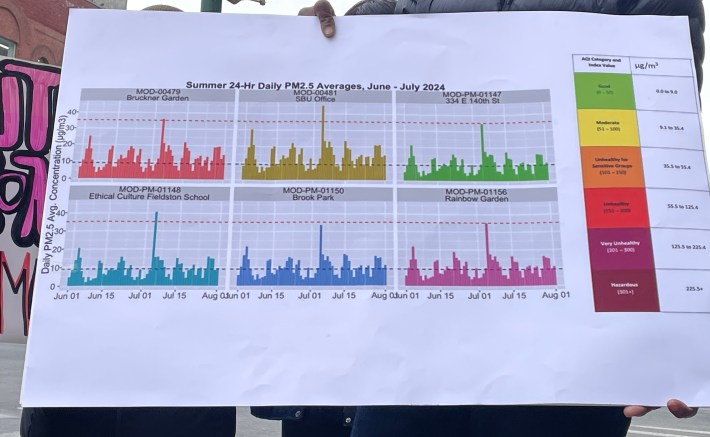Broken neighborhoods. Broken promises. Broken trust.
Congestion pricing has just begun, but environmental justice advocates in the Bronx are already sounding the alarm that they won't be satisfied until all of the promised pollution mitigations are in place.
Like now. And no half measures this time.
"What we want reduction in congestion, we want a reduction in pollution, we want reduction in [carbon monoxide] emissions," Mychal Johnson, the co-founder of South Bronx Unite said last week at a press conference called to keep the issue on the front burner. "We want to breathe fresh air. We don't want promises that are not being fulfilled, so until that's realized in a real, tangible way, we are not taking it for a fact that it's going to happen. We can't rest on those promises."
The MTA's own forecasts predict an increase in traffic in the Bronx from drivers steering clear of the new tolls by driving around Manhattan, though the increase will likely be less than the roughly 3,900 extra cars and trucks per day predicted when the toll was slated to be $15. Mitigating that damage was one way that the MTA got congestion pricing across the finish line.
Hence the promises: First, the replacement of 1,000 diesel-powered truck refrigeration units in the Hunts Point Produce Market with electric units and the opening of a Bronx asthma center. Second, air quality measures such as new air filters for schools near highways, more electric truck charging stations and new roadside vegetation to absorb pollutants.
And the MTA said that it will prioritize its Gun Hill and Kingsbridge bus depots electric bus upgrades.
Forgive South Bronx residents for thinking, "Been there, heard that."
In 2018, when Fresh Direct opened a distribution center on the Bronx waterfront, the company made promises — such as a five-year goal of electrifying its entire fleet — in order to get millions of dollars in subsidies from the city and state. It hasn't happened yet.
"We have seen promises of electrifying vehicles before [such as] Fresh Direct," Johnson said. "Their memorandum of understanding to the borough president when they came in said, 'We're going to electrify so we won't have a heavy environmental impact on this community.' They did not do it."
Dumped on forever
The South Bronx has been a particular area of focus for the MTA when it comes to air quality mitigation efforts. Neighborhoods like Hunts Point and Mott Haven have picked up the nickname Asthma Alley because of the massive highways built by 20th-century pols and their "progress"-eyeing highwaymen.
"The South Bronx suffers disproportionately from traffic, traffic-related air pollution and traffic-related noise," explained Markus Hilpert, a professor and environmental health scientist at Columbia University, who attended last Thursday's confab. "Everything started with the construction of the Major Deegan Expressway in 1939 and soon afterwards, the Bruckner Expressway was constructed."
In order to understand what impact congestion pricing has in terms of traffic spillover from people avoiding the toll, the MTA and the city Department of Health have committed to monitoring the air quality in those neighborhoods. That data will go public one year after the start of congestion pricing and every two years following, according to the agreement the MTA signed with the Federal Highway Administration when it authorized congestion pricing.
But South Bronx Unite and researchers from Columbia already do their own air quality monitoring. Even before congestion pricing, the sensors demonstrated multiple days in which the air quality in the South Bronx was significantly worse than the air quality in Riverdale, a wealthier and whiter part of the borough, Hilpert said.

It's up to the MTA and the various state and city agencies to follow through on their mitigation promises. Beyond the immorality of breaking a promise, failure could open up the MTA to lawsuits.
A wide range of bureaucracies will have to come together to get that done. The MTA is the lead agency on providing the mitigation funding, but the city and state departments of Transportation, the city Department of Health and a variety of other state and local agencies are all executing various parts of the plans.
Those agencies say they're pushing the efforts forward. Joseph Morrissey, a spokesperson for state DOT, told Streetsblog that the agency is in the process of selecting sites for the upcoming electric truck charging stations. Diesel truck refrigeration unit replacement is also moving forward, the MTA said.
"[City] DOT is in the process of procuring a company to run the truck refrigeration unit program," said MTA spokesperson Aaron Donovan. "They expect that process to be completed in the second quarter of this year. In the meantime, the agency is gauging interest among tenants operating in the market."
Converting 100 truck refrigeration units to electric "will eliminate three times more PM2.5 pollution and five times more NOx pollution than any additional tailpipe emissions from congestion pricing," Donovan said.
That will take some time.






